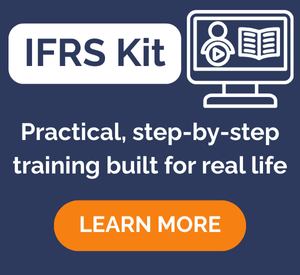How to prepare financial statements when going concern does NOT apply?
Pandemic of Covid-19 affects the economies and businesses on a worldwide scale.
Quite a big portion of these businesses will not make it, sadly, and will be forced to cease.
Today, I am answering the question asked by one of my readers in Singapore related exactly to a similar situation:
“I am now preparing the financial accounts of a company which is forced to cease its business, and it is apparent that the going concern basis is no longer appropriate.
I am not familiar with the presentation of the accounts using the basis other than the going concern basis.
Please could you provide a little guidance on how to prepare the financial statements under IFRS when going concern assumption does not apply?”
Answer: There is no specific IFRS guidance
This is another great question – well I think that all my readers ask great questions!
What is going concern?
It is one of the basic assumptions described in IAS 1 Presentation of financial statements.

The problem is that IAS 1 does not tell us how to prepare the financial statements when going concern does not apply.
There is no description of what you should do, how you should apply IFRS in this case and what policies to adopt when you are not going concern.
It means that we have to apply IFRS standards to the best of our knowledge and you have to consider carefully your individual circumstances to arrive at appropriate basis of accounting.
Alternative: Break-up basis of accounting
You can for example use so-called “break-up” basis of accounting. It is not defined in IFRS, that’s true, but it is defined in the legislation of some jurisdictions.
So if you apply the break-up basis, then the objective of financial statements is not to assess the financial performance of an entity as under going concern.
Here, you need to asses:
- Whether the company has sufficient assets to cover its liabilities, and
- If after all liabilities are settled, there will be some surplus or something left to distribute to shareholders.
However, your financial statements – the statement of financial position and the statement of total comprehensive income – will still look almost the same way, there’s no special format or anything.
It is more about the way of looking at individual assets and liabilities, about valuing them and presenting them.
Here, I’d like to outline a few issues to be aware of:
#1 Comply with IFRS
First of all, you still need to comply with the requirements of all other IFRS standards, even if you are not going concern.
So, not applying going concern does NOT make an excuse to depart from IFRS – that’s simply not true.
#2 Current vs. non-current distinction
Many people believe that they automatically must present all assets and liabilities as current if they are not going concern.
Not true.
So, if you classified your assets as non-current under IAS 1, then they are non-current.
They can become current if they meet the criteria in IFRS 5 Non-current assets held for sale and discontinued operations.
So if you plan to sell your PPE and you actively started to offer it at the market, then yes, they are held for sale, they meet the criteria in IFRS 5.
And, this can be true only about some portion of your PPE.
For example, you stopped production and trading, and now you started to offer your big machines for sale – OK, then classify them as current as they meet IFRS 5 criteria.
But, if you did not do the same with other assets, like cars, computers, etc. – then you have to keep them as long-term assets.
#3 Perform impairment testing
Liquidation, cessation of trade or production and after all – not going concern are all indicators of impairment.
Why?
Because, you are not going to use your assets to generate future economic benefits anymore and as a result, the recoverable amount can sharply fall down below their carrying amount.
IAS 36 requires performing the impairment test on tangible assets when there’s an indication of impairment, so there you go.
Sure, it does not necessarily mean that there will be the impairment, because the fair value of your assets can still be higher than the carrying amount, but you are at risk and you must test it.
#4 Valuation of inventories
As you might remember from IAS 2, you have to carry your inventories at lower of cost and net realizable value.
When you decide to close the business, then the net realizable value of stock might sharply go down as you are probably going to sell off everything you have in the warehouse.
#5 Onerous contracts
It can happen that some contracts can become onerous as a result of your decision to cease trading or close the business.
For example, you might need to pay high penalties for early termination of your lease contracts.
Therefore, maybe you need to make a provision in line with IAS 37.
#6 Government grants
Government grants can become repayable if you are not going concern.
#7 Clearly indicate
Finally, you have to show very clearly that the financial statements are not prepared under going concern assumption, usually in the notes.
Here’s the video summing up the issue:
If you have any comments or questions to this topic, please write me below – thank you!
JOIN OUR FREE NEWSLETTER AND GET
report "Top 7 IFRS Mistakes" + free IFRS mini-course
Please check your inbox to confirm your subscription.
26 Comments
Leave a Reply Cancel reply
Recent Comments
- Albert on Accounting for gain or loss on sale of shares classified at FVOCI
- Chris Kechagias on IFRS S1: What, How, Where, How much it costs
- atik on How to calculate deferred tax with step-by-step example (IAS 12)
- Stan on IFRS 9 Hedge accounting example: why and how to do it
- BSA on Change in the reporting period and comparatives
Categories
- Accounting Policies and Estimates (14)
- Consolidation and Groups (25)
- Current Assets (21)
- Financial Instruments (56)
- Financial Statements (54)
- Foreign Currency (9)
- IFRS Videos (74)
- Insurance (3)
- Most popular (7)
- Non-current Assets (56)
- Other Topics (15)
- Provisions and Other Liabilities (46)
- Revenue Recognition (27)
- Uncategorized (1)





Hi,
An entity is in losses and its management is planning to merge this entity with another entity within the same group; the 2nd entity’s name will be retained. Is this a non-going concern for the first entity and its FS be prepared on such basis?
No, because the entity will not cease trading; it will continue as a part of new merged entity.
Thank you Silvia for your continuous support to accounting profession. I would like to share with you and with your respected follower the liquidation standard issued by the Saudi Organization for Chartered and Professional Accountants. You can find it in the link below:
https://socpa.org.sa/getattachment/Socpa/Professional-standards/International-Standards/Technical-standards-and-mechanisms-that-complement/003.pdf.aspx?lang=ar-SA
Great, thank you for sharing! 🙂
Thanks Silvia
These made very interesting reading for me.
Hi Silvia, i wish you are safe with you family. May i consider as an alternative accounting basis the provision of USGAAP wich has an entirely section about this basis of presentation? Thanks for your answer.
Thanks Sylvia for your prompt reply.
But we have a legal case going on and we can probably have all our assets recovered and again resume operations if the legal outcome is in our favor.
Also we have taken some impairment provision at group level as we do not want to show the assets at lower value in entity financial statements to ensure we get compensated fully for all our assets at book value by the State. Would this justification good enough to preparr financial statements on going concern and recognise our assets at book value?
Thanks
Assuming the win in a legal case is not giving you a reason to account for a possible asset – it is a contingency under IAS 37 and you should treat your case analogically. S.
Thanks Sylvia . Always
We have a subsidiary company that had a single contract with the State valid up to Dec’24 and could be subjected to further renewal. However the State forcibly confiscated our assets in 2020(which were to be left with the State only at contract completion) and contracted another company to the perform the contract. Also our employees were hired by the new company.
We are considering our legal options
Can we prepare our financial statements on a going concern basis as we plan to complete our contract. If we do not prepare on a going concern there will be a significant write down of our assets as they are now operated by the other company and would make our legal claim significantly lower.
What would be the best way to deal with the situation
Mohammad, thank you for your comment, but here, this is not an accounting choice but management’s decision and I am really not sure I can express my opinion on this issue. You have to assess if the company has the viable alternative to continue its business within 12 months after the reporting period or not. And even if you assess that you are going concern, then you still do have strong impairment indication (loss of contract, confiscation of assets) and need to perform the impairment test. It is quite probable that under the situation given, you will have to recognize impairment losses regardless going concern or not.
Bank A has been acquired by Bank B on Mid Year under the guidelines of regulatory Body. Bank A needs to prepare the financials on the day before acquisition. So, how do I address this in the financial preparation and notes to accounts regarding going concern ?
My client who is company dealing with agriculture and veterinary services is closing his business and i have to prepare the financial statements on break up basis. how the capital grant, amortization of capital grant and deferred income can be shown in the financial statements
Good day Silvia
I appreciate the information you send to me it really helps me a lot especially with my studies. I have a question on IAS 10-Events after reporting period, as I am of the opinion that the impact of coronavirus is material on the operations of the entity as during regulation levels 4 and 5, the restaurant was closed, therefore not making any revenue during this period. The businesses were, however, still incurring some of the operational expenses such as rental, wages and salaries (these were at lower levels than during normal operations before coronavirus outbreak due to agreements with lessors and employees). Imagine lessors agreed to provide a rent concession of 35% of total monthly rental payments for the period from 01 March to 31 August 2020, while the employees agreed to take pay cut of 45% of their total cost to company over the same period. Before the coronavirus outbreak, the entity incurred monthly rental payments of R100 000 and the total cost to company for the employees per month is R80 000.
On the YouTube you just talked a bit about corona being a non adjusting event. May you please provide me with a thorough analysis of the impact of the coronavirus outbreak in terms of the standard on events after reporting period, to the extent that the information provided permits, especially to the agreements reached with the lessors and employees .Please provide me with an example of any disclosure, if any, required to be included in the financial statements imagine financial year ended 28 February 2020 in terms of the standard on events after reporting period.
Thank you in advice.
Hi Siliva,
Thank you for your post. Just curious – a client of mine will likely cease operations for a period as a result of COVID-19. Essentially, the Company is unable to generate revenues as long as the hotel industry is at a standstill and will temporary cease operations. There as been no resolution to cease operations and the client does not plan to liquidate.
Should I treat this on the NRV for not a going concern basis? I would like your thoughts.
Hi!
I have a related to unfunded gratuity scheme. Under IAS 19.
Whether actuarial valuation would be required if accounts are prepared on non going concern basis?
Hi Silvia
A subsidiary was incurring losses and found with financial difficultly to continue. It was planned to merge with its 100% owned parent (after the year end) and will be ceased to exist after the merger. However, the business operations of the merged subsidiary will be continued with that of the parent as their business operations are similar. Is the going concern assumption appropriate to the subsidiary as at the reporting date based on IFRS?
Thanks.
Yes, I think going concern is appropriate here, because change of the legal form is not the change in the economic substance of company’s activities.
Thank u Silvia!! U r marvellous!!
There is a question. If company is no more to continue its operations and converts its FA into current assets (not all) only what the company wants to sale according to ifrs 5.
But tell me what is the reason why company not removing all its assets as it is not in further operation? Why the company is keeping some of its Fixed Assets?
Thanks in Anticipation
Hi,
I am a student and I stumbled unto your page as I was having difficulty interpreting the IFRS’s. Thank you you are amazing. I always come here first to see if I can save time googling other interpretations and it has helped thus far in my studies
a company has a fixed long term contract (e.g. power plant) and it reaches to last year of its contract and renewal of contract is not expected. the management has no intention to liquidate but to wait for some appropriate time in future when there is increase in demand, how to account for this? Should it be treated as ‘non going concern’ one year before expiry of contract? whats the implications?
thank you for this clarification.
Absence of going concern means that the company will disappear within twelve months at latest. This means a lot for financial reporting. The next accounting period is assumed to be the last; accordingly:
a. the company will cease trading, therefore, all assets will be liquidated and all liabilities will be settled;
b. all assets and liability would be classified as current;
b. no need for any discounting, depreciation and amortization; in other word, measuring performance is not a priority at all. The objective is to assess whether the available assets (measured at their net realizable values) would cover the outstanding liabilities,
It seems that no area for applying IFRS in case of liquidation! FASB has an excellent pronouncements regarding liquidation and reorganization.
Hi Silvia,
Thank you for the wonderful session that you have done. I have some question relating to IFRS 5. Company ‘A’ decided to discontinue their operations. In the balance sheet they have Deferred tax assets.My first Q is 1) What is the treatment for Deferred tax Assets?
2)Company has a gross loss & Net loss after tax. So how do I present the discontinue operations effect in the P/L,B/S & cash flow.
Morning, I am in charge of a group of companies which we consolidate. However, one of the subsidiary companies has a loan and it has been called by the bank and as a result the going concern is questionable at the subsidiary. How, should the consolidation of this subsidiary be treated? The other issue is, that the same loan is guaranteed by the parent company which is also unlikely to pay.However, it has not been called at parent company How will the financials be prepared in light with the going concern note?
Hi Asher, you need to treat the consolidation exactly as when going concern applies, while taking all the above into account. However, you should assess whether the group as such is a going concern or not (regardless one subsidiary). Can the default of a subsidiary trigger going concern issue of the whole group? If not, then the group is a going concern and you would add disclosure only about that subsidiary. S.
Hellow Silvia
Can we communicate?
How we recognizes ,measurement,and presentation of constriction in progress